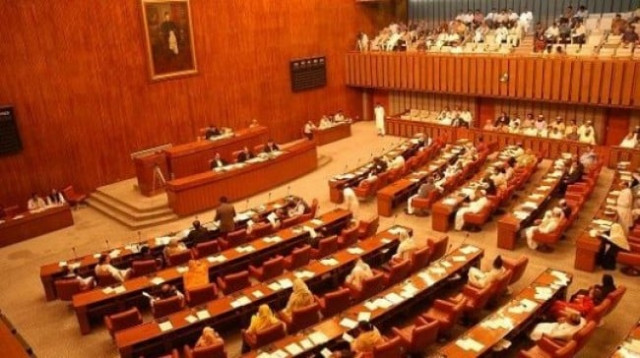Unanimous approval: Senate adopts 19th amendment
Prime Minister Yousaf Raza Gilani dubs 19th amendment a 'new year's gift'.

The Senate of Pakistan unanimously passed the 19th constitutional amendment bill bringing some changes to the procedure of appointment of judges to the superior courts. This was done in light of a judgment of the Supreme Court on the 18th amendment which the parliament had passed in April this year.
Already approved by the National Assembly the bill has been sent to the President for formal assent before it becomes part of the Constitution.
Under this amendment the number of senior judges as members of the Judicial Commission has been raised to four. The number of members of the parliamentary committee for the appointment of the Chief Election Commissioner has also been increased to 12.
The Chief Justice of Pakistan will make recommendations for the appointment of ad hoc judges in the superior courts in consultation with the Judicial Commission. The bill further proposes that in case of dissolution of National Assembly, the members of the parliamentary committee will be from the Senate only.
The amendment also provides permission for administrative and financial expenses of the Islamabad High Court. It also makes essential for the members of the bar council to have at least 15years of experience for appointment to the Judicial Council.
In the 100-member Senate 80 members voted in favour of the new amendment and none voted against it. Senators Hafiz Rasheed Ahmed and Muhammad Idress Safi had jointly proposed an amendment in clause 246 of the bill seeking the inclusion of 25 villages of Charsadda and Peshawar districts in the Tribal Areas; however, the House rejected the amendment. Senator Hafiz Rasheed Ahmed from Fata, as a mark of protest, voted against clause-2 of the bill during the second reading.
Chairman Parliamentary Reforms Committee Senator Raza Rabbani opposed the amendment and said that these villages are attached to settled districts and could not be included in Tribal Areas. He said the amendment was out of the scope of the bill and a separate procedure is required to include any area of settled districts to the Tribal Areas.
Among other developments in the upper house of the parliament, Senator Haroon Khan proposed the imposition of a tax on the agricultural sector; however, Raza Rabbani said that since the concurrent list has been abolished therefore it is a provincial subject.
Chairman Senate Farooq Naek while giving the ruling on the two amendments said that both were beyond the scope and limit of the 19th amendment bill.
Earlier, Senator Abdul Ghafoor Haideri said that some elements had tried to exclude clauses relating to Islamic laws from the constitution but his party had thwarted the attempt. Senator Begum Fouzia Fakhr-uz-Zaman said that granting immunity to a person is against Islamic injunctions. She also demanded creation of new provinces in the country with Senators Talha Mahmood and Muhammad Ali Durrani voicing a similar opinion. In the session Senator Shahid Bugti criticised the government for not taking to task the killers of Nawab Akbar Bugti.
Prime Minister Syed Yousaf Raza Gilani while speaking in the Senate after the passage of the bill expressed confidence that it will go a long way in strengthening state institutions and streamlining of their functions.
Gilani said that as long as his party enjoys a majority in the parliament it will continue to rule adding that it would support the majority if his party lost confidence of the assembly.
Published in The Express Tribune, December 31st, 2010.



















COMMENTS
Comments are moderated and generally will be posted if they are on-topic and not abusive.
For more information, please see our Comments FAQ